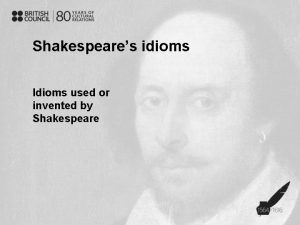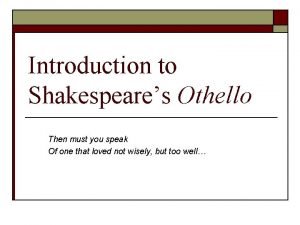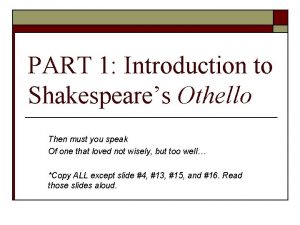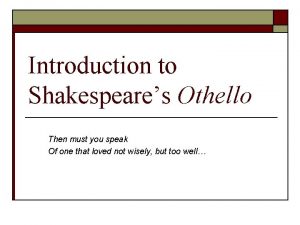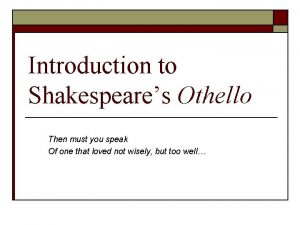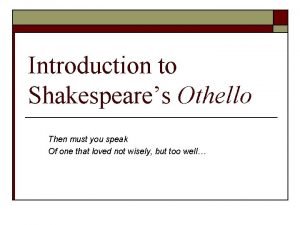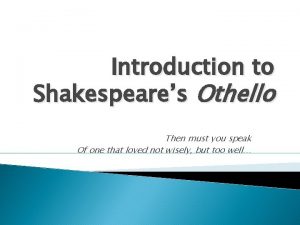PART 2 Introduction to Shakespeares Othello Then must








- Slides: 8

PART 2: Introduction to Shakespeare’s Othello Then must you speak Of one that loved not wisely, but too well…

Othello: A Tragedy • Written in 1604 • One of the major tragedies -- after Hamlet and before King Lear and Macbeth • Fascination with evil • Study the devastating effects of the deadly sins of the spirit: ambitious pride, ingratitude, wrath, jealousy and vengeful hate

Othello: Poetic Images • Focused on the natural world • Most important pattern – contrast of light and dark, black and white • One cluster is domestic and animal: goats, monkeys, wolves, baboons, guinea hens, wildcats, spiders, flies, asses, dogs, horses, sheep, serpents, and toads • Other images include greeneyed monsters, devils, poisons, money purses, tarnished jewels, music untuned, and light extinguished

Othello Terminology: Moor • Muslim person of Arab and Berber descent from northwest Africa • Moors invaded Spain and established a civilization in Andalusia lasting from the 8 th -- 15 th centuries • Term Moor comes from the Greek work mauros meaning dark or very black • In Renaissance drama, Moors often symbolized something other than human - and often, indeed, something devilish.

Othello the Character • Othello‘s position and status – Othello is a professional soldier who, after much battlefield experience, is currently employed by Venice as general of its forces. He is called “General“ or (sometimes) “Captain. “ He holds a high position and is greatly respected.

The Villain in Othello • Delights in evil for its own sake • Conscienceless, sinister, and amused by his own cunning • Related to Vice, the figure of personified evil, from the medieval morality play whose role is to win Humankind away from virtue and corrupt him with worldly enticements • Takes audience into his confidence, boasts in soliloquy of his cleverness, exults in the triumph of evil, and improvises plans with daring and resourcefulness

• Ancient – A military rank, properly of a standard-bearer (same word as “ensign“). This is Iago‘s rank, which he resents. He is third in command to Othello, behind Cassio.

Essential Questions to Consider as You Read the Play • What is the relationship between personal choices and consequences? • How is pride an asset or a detriment? • How does political decline reflect moral decay?




